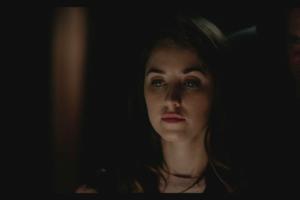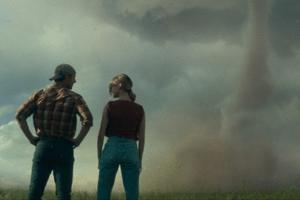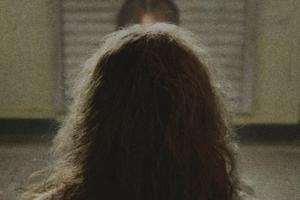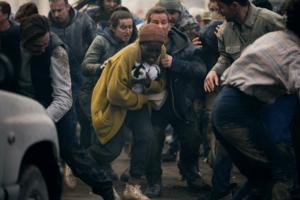Entertainment
/ArcaMax

Review: 'Crumb Catcher' and Mirror Images.
"Crumb Catcher," a first feature by writer-director Chris Skotchdopole that's being ushered into the world by low-budget filmmaking eminence Larry Fessenden, has a vaguely familiar feel. There's a nasty buzz to the plot and the performances that recalls old bad-vibes character studies like "The Last Seduction" and "The Honeymoon Killers," and ...Read more

Review: 'Twisters' is Not Their First Tornadeo
The most special of the many special effects in "Twisters" isn't what you'd expect. It's not the howling winds, the towering thunder spouts, the hollering woman getting yanked up into a stormy sky by a bunch of bad weather. No, the biggest kick in this movie is the easy chemistry between its two stars -- the smiley and inordinately likable Glen ...Read more

Review: 'Longlegs' or Nic Cage Back in Crazy Town
"Longlegs," a combination supernatural thriller and gritty police procedural by writer-director Oz Perkins, mines elements from a host of well-known films, among them David Fincher's "Zodiac" (there's a sinister code) and "Se7en" (sinister boxes), and the pictures that make up the "Conjuring" universe (sinister dolls). But the movie's primary ...Read more
Review: Everybody's Favorite Slasher Sweetheart Returns in 'MaXXXine'
"Do you know what happened to the last person who tried to kill me?" Maxine Minx asks the creep who's followed her down Hollywood Boulevard into a dead-end alley. The guy's not very scary -- he's dressed like Buster Keaton, complete with Keaton's little flat hat. And anyway, Maxine, the upwardly mobile porn star, is armed and decidedly dangerous...Read more

Review: A Quiet Place: Day One Makes for a Diminishing Return
Fans of the "Quiet Place" franchise will get a reasonable ration of what they presumably crave in the story's third installment. Which is to say they'll see herds of rampant space aliens scampering up the sides of buildings and dropping from the sky and generally tearing around like the world's biggest mutant basketball team in a hard-fought ...Read more

Review: 'Kinds of Kindness' is an Unexpected Miss by 'Poor Things' Director Yorgos Lanthimos
Like the rest of us, good filmmakers sometimes screw up. David Cronenberg has made several canon-level movies ("Videodrome," "Dead Ringers," etc.), but his mopey 2012 take on the Don DeLillo novel "Cosmopolis," which starred Robert Pattinson, was anti-watchable. Similarly, when the great screenwriter Charlie Kaufman ("Adaptation," "Being John ...Read more
Review: 'Treasure' or What Did You Do in the War, Daddy?
Not everybody was totally taken with Lena Dunham when she appeared on the movie scene in 2010. She came bearing her first feature, "Tiny Furniture," which she had written, directed and starred in -- at the age of 23. The movie heralded the arrival of a bright new filmmaker, and it was a critical hit. But there was some grumbling about it, too. ...Read more
Review: In 'I Used to Be Funny' Rachel Sennott Tops Herself
ATTENTION KURT LODER EDITORS: THERE IS A MANDATORY CORRECTION TO THE COLUMN FOR RELEASE FRIDAY, JUNE 7. IN THE FIRST GRAF, PLEASE REMOVE THE PHRASE "COWRITTEN BY SENNOTT HERSELF." PLEASE USE THE FOLLOWING CORRECTED COPY. THANK YOU -- CREATORS
----
Indie queen Rachel Sennott, with her pliable features and masterfully droll delivery, has the ...Read more

Review: 'Handling the Undead' or The End?
Imagine if nobody ever died. Imagine how crowded the world would be. Imagine the decline in the quality of cocktail chat. In Norwegian director Thea Hvistendahl's "Handling the Undead," people do die in traditional ways, but then they come right back, as if not wanting to miss anything. As you'd hope, this creates problems.
The movie in some ...Read more
Review: 'Furiosa - A Mad Max Saga' or Wasteland Re-Revisited
George Miller's last "Mad Max" movie, the 2015 "Fury Road," was such a titanic achievement -- an action classic that all but ran you over -- that you wondered if he could ever possibly top it. Now, with the new prequel "Furiosa: A Mad Max Saga," we have the answer. And the answer is: possibly, but not right now.
"Furiosa" is a top-flight action...Read more
Review: 'Poolman' is a serious Glug
"Poolman" is a movie that offers much food for thought. Mainly, who thought it was a good idea to greenlight this project with a first-time director -- actor Chris Pine -- who was also the star and co-wrote the funless script as well? Whoever that person was must have about 300 apoplectic emails fizzing around in their office inbox right now. ...Read more
Review: 'The Fall Guy' has Ryan Gosling and Emily Blunt in a Fast-Talking Action-Com
What's your favorite movie stunt? Mine -- well, one of them -- takes place in the intricate opening sequence of 1984's "Indiana Jones and the Temple of Doom." It's the scene in which Indy and his companion, the shrieky nightclub singer Willie Scott (Kate Capshaw), are making a frantic exit from a club owned by Shanghai crime lord Lao Che. ...Read more






